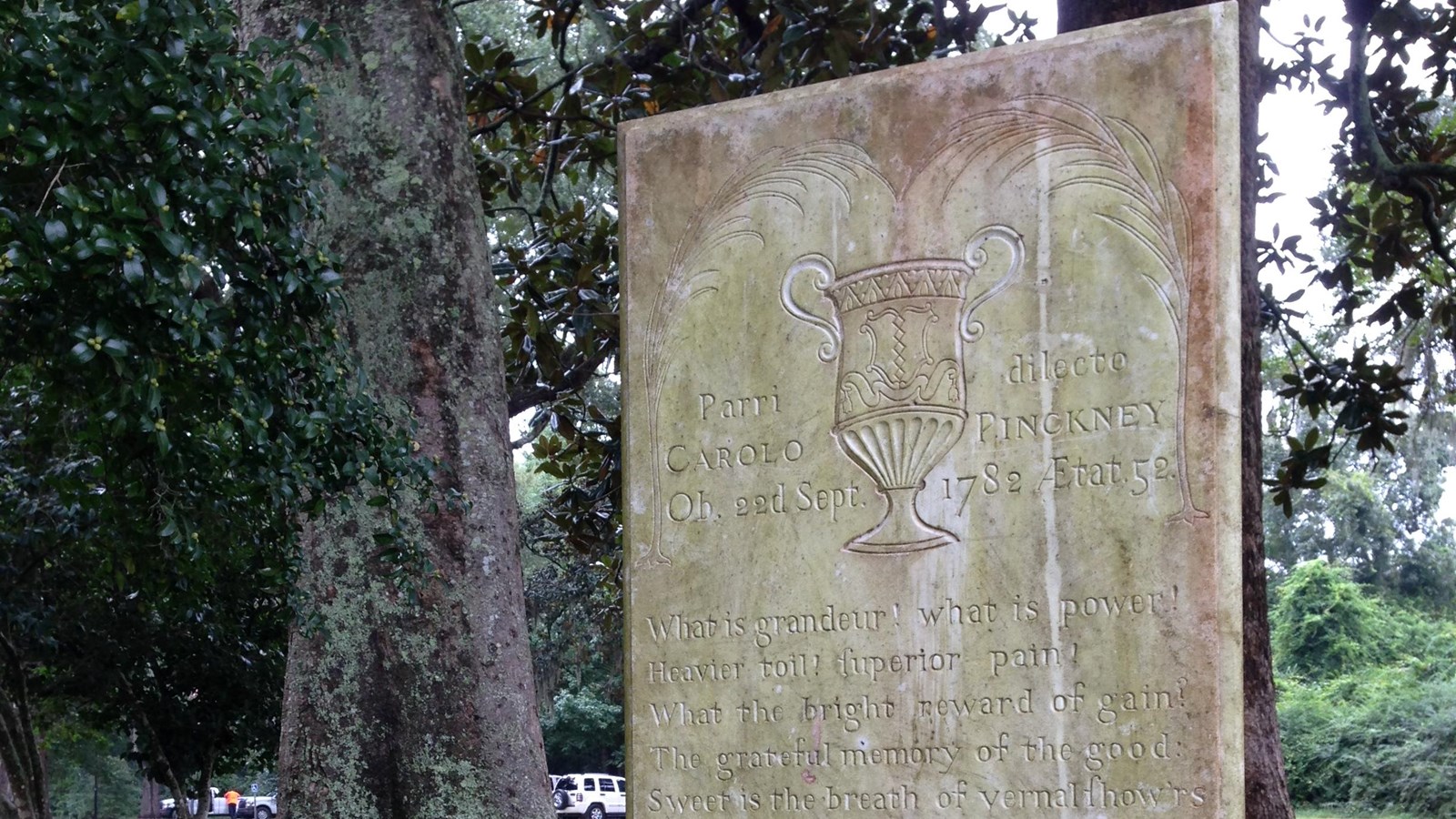Last updated: August 28, 2021
Place
Colonel Charles Pinckney Cenotaph

NPS (Taormina)
Quick Facts
Location:
Mount Pleasant, South Carolina
Amenities
1 listed
Scenic View/Photo Spot
Southeast of the house, sheltered by a tree sits an object of curiosity for many visitors to Charles Pinckney NHS, the Colonel Charles Pinckney cenotaph.
A cenotaph is an empty tomb or a monument. In 1785, Pinckney commissioned a stone for his father’s grave at St. Philip’s Church Cemetery in Charleston. The stone’s inscription had an error, so he ordered a new stone for the grave and had the original stone sent to Snee Farm (Matthews 2004:xiv). It was moved from the farm to the yard of the nearby Christ Church in the late nineteenth century. The replica cenotaph was placed by Thomas and Alexandra Stone, who owned the farm from 1943 until the 1960s.
It has a large, bas-relief urn flanked by arching willows in the upper half. The first three lines of the inscription on the slab are split vertically by the urn and read “Parri Dilecto, Carolo Pinckney, Ob. 22d Sept. 1782 Aetat 52.” Below the urn is the rest of the inscription, which reads,
What is grandeur! What is power! / Heavier toil! Superior pain! / What the bright reward of gain? / The grateful memory of the good / Sweet is the breath of vernal show’rs / The bees collected creature sweet / Sweet Music’s folk but sweeter yet / The still small voice of GRATITUDE / The generous spark for ever live / Teach me to Love, and to forgive / Exact my own defeats to scan / What others are to feel and know / My son A MAN / In grateful memory of an affectionate / Father this Stone is raised by his Son / Charles Pinckney, Anno Domini / 1785.
A cenotaph is an empty tomb or a monument. In 1785, Pinckney commissioned a stone for his father’s grave at St. Philip’s Church Cemetery in Charleston. The stone’s inscription had an error, so he ordered a new stone for the grave and had the original stone sent to Snee Farm (Matthews 2004:xiv). It was moved from the farm to the yard of the nearby Christ Church in the late nineteenth century. The replica cenotaph was placed by Thomas and Alexandra Stone, who owned the farm from 1943 until the 1960s.
It has a large, bas-relief urn flanked by arching willows in the upper half. The first three lines of the inscription on the slab are split vertically by the urn and read “Parri Dilecto, Carolo Pinckney, Ob. 22d Sept. 1782 Aetat 52.” Below the urn is the rest of the inscription, which reads,
What is grandeur! What is power! / Heavier toil! Superior pain! / What the bright reward of gain? / The grateful memory of the good / Sweet is the breath of vernal show’rs / The bees collected creature sweet / Sweet Music’s folk but sweeter yet / The still small voice of GRATITUDE / The generous spark for ever live / Teach me to Love, and to forgive / Exact my own defeats to scan / What others are to feel and know / My son A MAN / In grateful memory of an affectionate / Father this Stone is raised by his Son / Charles Pinckney, Anno Domini / 1785.
